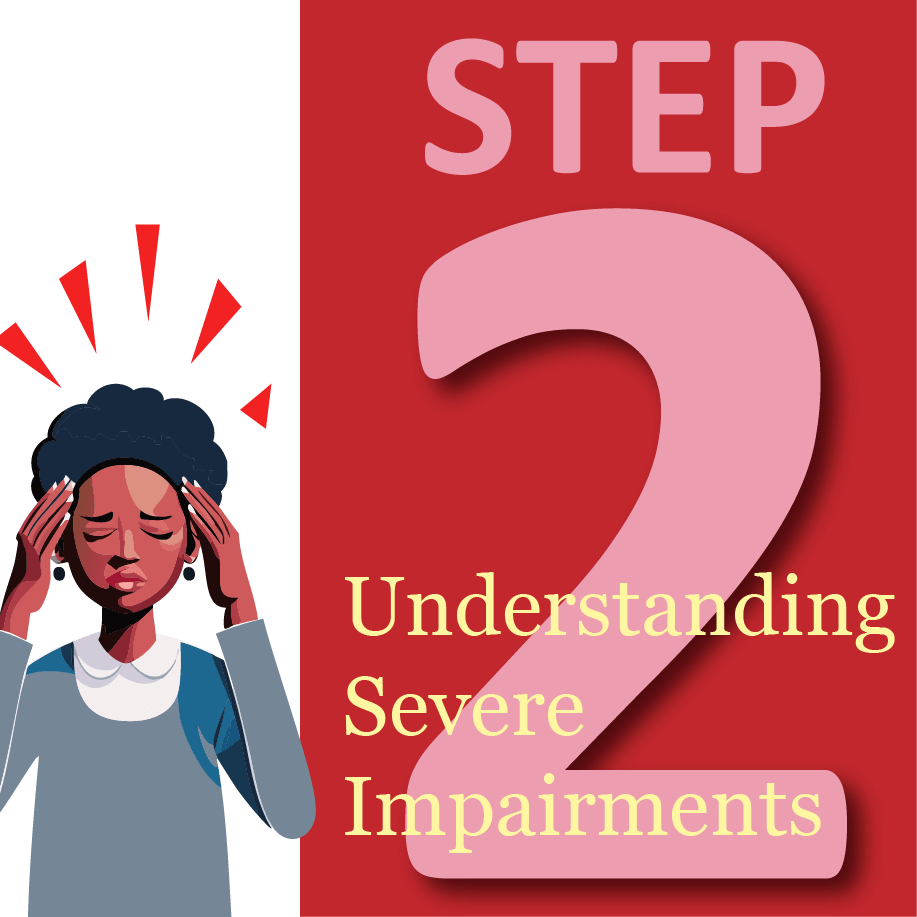Step 2: What is a Severe Impairment?

Disclaimer: The information below is not legal advice and is intended for informational purposes only. Information on this website may not constitute the most up-to-date legal or other information. Please contact us directly to discuss any specific, particular legal matter.
If you don’t have an impairment that SSA considers “severe” and “medically determinable,” then you’re not disabled according to the Social Security Administration. It’s not enough to have a collection of symptoms, even if they’re extremely debilitating. There must also be objective evidence of something going wrong with your body or mind.
What is meant by “severe”?
“Severe” for Social Security purposes is not a strong term at all. It just means that the impairment “significantly limits your physical or mental ability to do basic work activities.”[1] In short, if your medically determinable impairment limits your ability to work by more than a tiny amount, it’s “severe” even if you could still work around it to some extent.
The impairment also must last or be expected to last for 12 months or more. Pregnancy is, by definition, non-severe even though many pregnancies seriously limit the ability to do basic work activities because it only lasts for nine months. On the other hand, if you have a leg amputated, the impairment is expected to last for 12 months or more even if it happened yesterday because the leg is not going to grow back. There’s still quite a bit of question about, for example, post-COVID syndrome because we don’t know yet how common it is for that impairment to last for 12 months or more.
What is meant by “medically determinable”?
The impairment also must be “medically determinable.” This means that the impairment “must result from anatomical, physiological, or psychological abnormalities that can be shown by medically acceptable clinical and laboratory diagnostic techniques.”[2] In other words, there has to be something limiting you that can be objectively measured. Moreover, “a physical or mental impairment must be established by objective medical evidence from an acceptable medical source.”[3]
An “acceptable medical source” for purposes of any claim filed after March 27, 2017 includes doctors (MD or DO), psychologists (Ph.D. or Psy.D.), optometrists for visual disorders, podiatrists for foot/ankle disorders; speech/language pathologists for speech and language impairments; audiologists for hearing loss, audio processing disorders, and balance disorders; nurse practitioners within their scope of practice; and physicians’ assistants within their scope of practice.[4]
What if I haven’t been to a medical provider recently?
If you are experiencing symptoms but no acceptable medical source has ever tested you to try to find out what’s going on, then you are going to have an extremely difficult time proving that you are disabled. In general, if an impairment is not documented the medical evidence, then so far as Social Security is concerned, it doesn’t exist.
Sometimes the Social Security Administration will send you to doctors that they pay for to assess you, but it’s not a good idea to count on those examinations alone. The law permits but does not require such examinations under most circumstances. So, if you haven’t been to a doctor or other medical provider for your disabling conditions, best practice is to get to one before filing for disability.
What if my medical providers don’t know what’s wrong with me?
The law requires that the severe impairment result from an abnormality that can be shown by objective evidence. So long as there is objective evidence from an acceptable medical source of some condition that could reasonably result in the symptoms that you are experiencing, then you can be found to have a severe medically determinable impairment. The key to these types of ailments is regular treatment and exploration with various specialists to show a pattern of trying to figure out what is causing your limitations.
[1] 20 CFR § 404.1520(c); 20 CFR § 416.920(c).
[2] 20 CFR § 404.1521; 20 CFR § 416.921.
[3] Id.
[4] 20 CFR § 404.1502(a); 20 CFR § 416.902(a).

